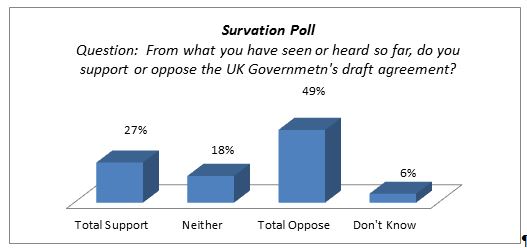On November 22, UK and European Union leaders announced a Brexit withdrawal deal after 524 days of negotiations. But the drama is far from over yet. Prime Minister Theresa May still has to get her agreement voted through Parliament, which is scheduled for December 11, and there’s a strong possibly that it won’t happen. May’s political opponents in Britain are working hard to thwart the agreement which they say is “the worst of all worlds”. May is facing opposition on all sides: pro-Brexit hardliners who find the agreement too compromised, pro-EU conservatives who hope to remain in the EU, the Northern Irish party who worry about the Irish border, and nearly all of the Labour Party. A handful of prominent Brexiteers even called for her resignation. Parliament Minister Jacob Rees-Mogg accused May of breaking her promises on Brexit and asked her to give him a reason not to formally call for a leadership challenge within the Conservative Party. The dissent even extends to May’s own cabinet. Two of her top Cabinet ministers (Dominic Raab and Esther McVey) resigned in protest on Thursday, as well as two junior ministers, two parliamentary secretaries, and the Vice Chairman of the Conservative Party, and others may well follow their lead.
And, the opposition doesn’t stop there. A recent poll conducted by Survation revealed that only 16% of voters would support the Prime Minister’s agreement if given a choice between that, continued membership in the EU, or a no deal divorce from the EU, while almost half, 49% of voters, said they are opposed to the plan.

The One Thing They Can All Agree On – Everyone Hates It
Criticism of the deal stems from the terms of the withdrawal agreement itself, particularly in regard to citizens’ rights, the divorce bill, and the proposed Irish border backstop. The agreement would still bind the UK into accepting most of the EU rules, which is one of the most compelling reasons why voters supported the British exit in the first place.
Citizens’ Rights
The withdrawal agreement assures the rights of more than 3.2 million EU and over 1 million UK citizens to retain their current rights to stay in the countries in which they have made their home. The agreement safeguards these rights until the end of the transition period, which could last until the end of 2020. PM May had hoped to limit the cut-off date to those who arrived in the UK before 29 March 2019 (Brexit Day), but she lost out.
Divorce Bill
Brexiteers reacted angrily to reports published on Wednesday that Britain will pay up to €55bn to leave the EU. Leading campaigner Nigel Farage wrote in the Daily Telegraph, “For a sum of this magnitude to be agreed, in return for nothing more than a promise of a decent settlement on trade, represents a complete and total sellout.”
Irish Border Backstop
The Prime Minister negotiated a temporary backstop deal to keep the border open between Northern Ireland and the Republic of Ireland until a new trade agreement can be negotiated or indefinitely if an agreement cannot be reached. And the deal she made? The UK will remain in the EU Customs Union while Northern Ireland will follow single market rules. Brexit supporters vehemently oppose the backstop, fearing it will keep the UK “shackled” to the EU and unable to negotiate new trade deals.
What’s the difference between the EU customs union and the single market? The customs union is a 50-year old agreement which facilities free trade by ensuring that no tariffs are imposed on good traveling across the borders of the member states and that all member states apply the same import duties and quotas on all goods entering the union. This means that goods can travel freely once they are within the EU. The single market not only encompasses the free movements of goods, but is a broader agreement which allows for the free movement of services, investment, and people.
If Parliament Votes No, What Happens Next?
 If Parliament votes no on the PM’s withdrawal agreement, the Labour Party will demand a second referendum (a people’s vote) to revoke Article 50 of the Treaty on European Union, (known as Brexit). While that argument is making more headway than many thought possible, there’s not enough support for it in Parliament, but that could possibly change.
If Parliament votes no on the PM’s withdrawal agreement, the Labour Party will demand a second referendum (a people’s vote) to revoke Article 50 of the Treaty on European Union, (known as Brexit). While that argument is making more headway than many thought possible, there’s not enough support for it in Parliament, but that could possibly change.
There is a chance that if the deal is voted down, the UK would crash out of the bloc party on March 29, 2019 with a no-deal Brexit. Analysts have warned that a no deal exit could snarl trade and freeze markets. Bottlenecks could bring shortages of everything from food to medications and manufacturing components. The Bank of England warned that a no-deal Brexit could send the pound plunging and trigger a worse recession that the financial crisis of 2008. It warns that the UK economy could shrink by as much as 8% in the immediate aftermath and house prices could fall by almost a third.
This leaves one last scenario: The Prime Minister is sent back to Brussels to try to renegotiate the withdrawal agreement yet again. While most feel that May would only succeed in making “token concessions”, the EU has already announced that it will not renegotiate. The EU has made its position very clear – the deal on the table is the only choice.
_______________
Sources
- The Washington Post
- Forbes
- The Guardian
- The Telegraph
- Politico SPRL
- News24

